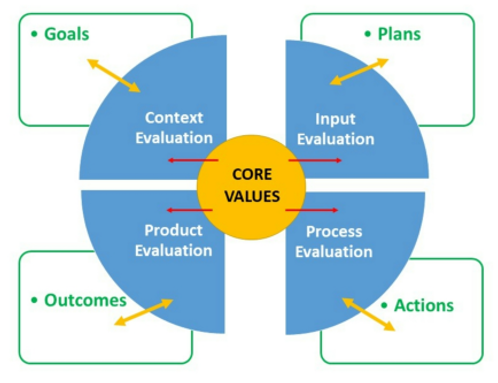Evaluation of the Dhuha Prayer Program Based on the CIPP Model: Study of Islamic Education in Elementary Schools
DOI:
https://doi.org/10.51574/ijrer.v4i4.3814Keywords:
CIPP Model, Duha Prayer, Islamic Religious Education, Program Evaluation, Public Elementary SchoolAbstract
The Duha prayer in schools is a tangible kind of character education that shapes kids' personalities and morals. These ideals must be instilled early in education, especially in elementary school. Therefore, this study aims to evaluate the implementation of the Duha prayer program at Public Elementary School, using the CIPP (Context, Input, Process, Product) model. This study was conducted at Public Elementary School Baebunta District, North Luwu Regency. This qualitative study is descriptive-evaluative, with data obtained through interviews, observations, and documentation involving the principal, teachers, students, and parents. The results of the study indicate that (1) context: the Duha prayer program strengthens the religious character of students and is supported by school policies and the surrounding environment; (2) input: facilities and infrastructure are still limited, such as the lack of a special prayer room, but Islamic religious education teacher resources are adequate; (3) process: implementation is carried out routinely through the habit of two rakaat, joint prayer, and direct guidance by teachers; and (4) product: activities contribute positively to student discipline and habituation of worship, although parental involvement at home still needs to be improved. The conclusion of this study is that the implementation of the Duha prayer at Public Elementary School Baebunta District is going well, despite limited facilities and environmental support that still need improvement. Recommendations are directed at improving prayer facilities, coordinating with parents, and developing more varied strategies for habituating prayer.
References
Al-Shanawani, H. M. (2019). Evaluation of self-learning curriculum for kindergarten using Stufflebeam’s CIPP model. Sage Open, 9(1), 2158244018822380. https://doi.org/10.1177/2158244018822380
Al Widyatri, G., & Sabardila, A. (2023). The Impact of Duha Prayer and Al-Ma'surat Reading on Increasing Student Grades. EDUKASI: Jurnal Pendidikan Islam, 11(1), 76-87. https://ejournal.staimta.ac.id/index.php/edukasi/article/view/304
Akrim, A. (2022). A new direction of Islamic education in Indonesia: Opportunities and challenges in the Industrial Revolution Era 4.0. Edukasi Islami: Jurnal Pendidikan Islam, 11(01), 35-48. https://doi.org/10.30868/ei.v11i01.1799
Biantoro, O. F., & Istiqlal, M. (2024). Internalization of Religious Values through Dhuha Prayer in Early Childhood. In Proceeding of International Interdiciplinary Conference And Research Expo (Vol. 1, No. 1, pp. 123-135).
Dizon, A. G. (2023). Historical development of CIPP as a curriculum evaluation model. History of Education, 52(1), 109-128. https://doi.org/10.1080/0046760X.2022.2098390
Fajeri, S., Husin, S. K., & bin Abdul Aziz, A. R. (2022). Implementation of Religious Values Through Dhuha Prayer and Tahfidz Alquran Activities in Children. In The International Conference on Education, Social Sciences and Technology (ICESST) (Vol. 1, No. 2, pp. 61-69).
Guna, B. W. K., & Yuwantiningrum, S. E. (2024). Building Morality and Ethics Through Islamic Religious Education In Schools. IJGIE (International Journal of Graduate of Islamic Education), 5(1), 14-24. https://doi.org/10.37567/ijgie.v5i1.2685
Halid, A. (2024). Prospek pendidikan agama islam: studi analisis terhadap undang-undang nomor 20 tahun 2003 tentang sistem pendidikan nasional indonesia. FAJAR Jurnal Pendidikan Islam, 4(1), 5-20.
Haron, H., Jamil, N. N., & Ramli, N. M. (2020). Western and Islamic values and ethics: are they different?. Journal of Governance and Integrity, 4(1), 12-28. https://doi.org/10.15282/jgi.4.1.2020.5609
Hasibuan, A. R., & Ritonga, M. S. (2024). The Role of Character Education in Elementary School Students in the Digital Age. Education Journal of Indonesia, 5(1). https://doi.org/10.30596/eji.v5i1.4290
Islam, M. T., Miftah, M. M., & Marjany, N. M. (2024). Dhuha Prayer as A Solution in Implementing Morals at MTs Lailatul Qadar Sukoharjo. Jurnal Pendidikan: Riset dan Konseptual, 8(1), 64-69. https://journal.unublitar.ac.id/pendidikan/index.php/Riset_Konseptual/article/view/948
Khasanah, S., & Novita, N. A. (2025). Strategy for Internalizing Islamic Character Values through the Dhuha Prayer Program: A Qualitative Study at SMK Muhammadiyah Salaman. IJGIE (International Journal of Graduate of Islamic Education), 6(2), 418-437. https://doi.org/10.37567/ijgie.v6i2.4033
Lahmar, F. (2020). Islamic education: An Islamic “wisdom-based cultural environment” in a western context. Religions, 11(8), 409. https://doi.org/10.3390/rel11080409
Mujahid, I. (2021). Islamic orthodoxy-based character education: creating moderate Muslim in a modern pesantren in Indonesia. Indonesian Journal of Islam and Muslim Societies, 11(2), 185-212. https://doi.org/10.18326/ijims.v11i2.185-212
Qistina, N. I., & Khadijah, K. (2025). An Analysis of the Dhuha Prayer Program in Shaping Religious Character among 5–6-Year-Olds in Kindergarten. Indonesian Journal of Early Childhood Educational Research (IJECER), 4(1), 214-224. https://ejournal.uinmybatusangkar.ac.id/ojs/index.php/ijecer/article/view/15283
Ramatni, A., Fata, T. H., & Surajiyo, S. (2025). Management of character learning based on islamic education: a literature review. JPPI (Jurnal Penelitian Pendidikan Indonesia), 11(2), 116-127. https://doi.org/10.29210/020254778
Rodiyah, N., Mispani, M., & Amirudin, A. (2024). The Habit of Dhuha Prayer in Forming Children Character. International Journal on Advanced Science, Education, and Religion, 7(1), 103-115. https://doi.org/10.33648/ijoaser.v7i1.523
Sahin, A. (2018). Critical issues in Islamic education studies: Rethinking Islamic and Western liberal secular values of education. Religions, 9(11), 335. https://doi.org/10.3390/rel9110335
Solihin, I., Hasanah, A., & Fajrussalam, H. (2020). Core ethical values of character education based on Islamic values in Islamic boarding schools. International Journal on Advanced Science, Education, and Religion, 3(2), 21-33. https://doi.org/10.33648/ijoaser.v3i2.51
Stufflebeam, D. L., & Zhang, G. (2017). The CIPP evaluation model: How to evaluate for improvement and accountability. Guilford Publications.
Surana, D., Muhammad, G., Sanusi, I., Nurhakim, H. Q. A., & Pamungkas, M. I. (2024). The Effect of Dhuha Prayer Habituation on the Awareness of Performing Fard Prayers among Madrasah Ibtidaiyah Students. MUDARRISA: Jurnal Kajian Pendidikan Islam, 16(2), 226-247. https://doi.org/10.18326/mudarrisa.v16i2.2582
Tambak, S., Hamzah, H., Sukenti, D., & Sabdin, M. (2021). Internalization of Islamic Values in Developing Students' Actual Morals. JPI (Jurnal Pendidikan Indonesia), 10(4), 697-709. https://doi.org/10.23887/jpi-undiksha.v10i4.30328
Warju, W. (2016). Educational program evaluation using CIPP model. Invotec, 12(1). https://ejournal.upi.edu/index.php/invotec/article/view/4502
Wiguna, A., Setiani, F., & Heriyanto, A. (2020). Dhuha prayer and character strength of students. In 1st International Conference on Science, Health, Economics, Education and Technology (ICoSHEET 2019) (pp. 90-93). Atlantis Press.
Zahro, Y. S. (2025). The Impact of Dhuha Prayer on Students' Emotional Intelligence: A Management Perspective in School Settings. Journal of Educational Management Research, 4(2), 736-753. https://doi.org/10.61987/jemr.v4i2.850

Downloads
Published
How to Cite
Issue
Section
License
Copyright (c) 2025 Herawaty Asnur, Muhaemin Muhaemin, Bustanul Iman RN

This work is licensed under a Creative Commons Attribution-ShareAlike 4.0 International License.









1.png)













